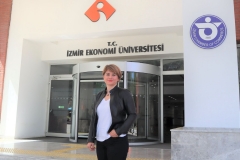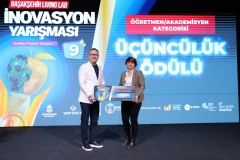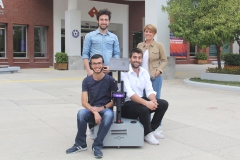
FACULTY OF ENGINEERING
Department of Electrical and Electronics Engineering
EEE 422 | Course Introduction and Application Information
| Course Name |
Microwave Engineering
|
|
Code
|
Semester
|
Theory
(hour/week) |
Application/Lab
(hour/week) |
Local Credits
|
ECTS
|
|
EEE 422
|
Fall/Spring
|
3
|
0
|
3
|
5
|
| Prerequisites |
|
|||||||
| Course Language |
English
|
|||||||
| Course Type |
Elective
|
|||||||
| Course Level |
First Cycle
|
|||||||
| Mode of Delivery | - | |||||||
| Teaching Methods and Techniques of the Course | - | |||||||
| Course Coordinator | - | |||||||
| Course Lecturer(s) | - | |||||||
| Assistant(s) | - | |||||||
| Course Objectives | This course introduces the fundamental techniques necessary for the design and analysis of microwave circuits and systems. Electromagnetic theory, transmission line theory, waveguides, passive microstrip circuits, microwave network analysis, impedance matching and tuning, design of microwave amplifiers, microwave filters and resonators will be discussed with emphasis on practical understanding of microwave engineering. |
| Learning Outcomes |
The students who succeeded in this course;
|
| Course Description | The following topics will be included: Review of electromagnetic theory; transmission lines and waveguides; circuit theory for waveguiding systems; impedence matching and transformation; passive microwave devices; electromagnetic resonators; and periodic structures and filters. |
|
|
Core Courses | |
| Major Area Courses |
X
|
|
| Supportive Courses | ||
| Media and Management Skills Courses | ||
| Transferable Skill Courses |
WEEKLY SUBJECTS AND RELATED PREPARATION STUDIES
| Week | Subjects | Related Preparation |
| 1 | Introduction to Microwave Engineering and Review | Chapter 1. D. M. Pozar. ISBN 0471448788. |
| 2 | Review of Electromagnetic Theory | Chapter 1. D. M. Pozar. ISBN 0471448788. |
| 3 | Transmission Line Theory | Chapter 2. D. M. Pozar. ISBN 0471448788. |
| 4 | The Smith Chart, Generator and Load Mismatches, Lossy Transmission Lines | Chapter 2. D. M. Pozar. ISBN 0471448788. |
| 5 | Transmission Lines and Waveguides | Chapter 3. D. M. Pozar. ISBN 0471448788. |
| 6 | Transmission Lines and Waveguides | Chapter 3. D. M. Pozar. ISBN 0471448788. |
| 7 | Microwave Network Analysis | Chapter 4. D. M. Pozar. ISBN 0471448788. |
| 8 | Microwave Network Analysis | Chapter 4. D. M. Pozar. ISBN 0471448788. |
| 9 | Impedance Matching and Tuning | Chapter 5. D. M. Pozar. ISBN 0471448788. |
| 10 | Microwave Resonators | Chapter 6. D. M. Pozar. ISBN 0471448788. |
| 11 | Power Dividers and Directional Couplers | Chapter 7. D. M. Pozar. ISBN 0471448788. |
| 12 | Microwave Filters | Chapter 8. D. M. Pozar. ISBN 0471448788. |
| 13 | Noise and Active RF Components | Chapter 10. D. M. Pozar. ISBN 0471448788. |
| 14 | Microwave Amplifier Design | Chapter 11. D. M. Pozar. ISBN 0471448788. |
| 15 | Microwave Systems Applications | Chapter 13. D. M. Pozar. ISBN 0471448788. |
| 16 | Final Review | Lecture Notes |
| Course Notes/Textbooks | D. M. Pozar, “Microwave Engineering”, 3rd Ed., John Wiley & Sons, 2005, ISBN 0471448788. |
| Suggested Readings/Materials | R. E. Collin, “Foundations for Microwave Engineering”, 2nd Ed., McGrawHill, 1992, ISBN 0071125698. |
EVALUATION SYSTEM
| Semester Activities | Number | Weigthing |
| Participation | ||
| Laboratory / Application | ||
| Field Work | ||
| Quizzes / Studio Critiques |
2
|
20
|
| Portfolio | ||
| Homework / Assignments |
8
|
20
|
| Presentation / Jury | ||
| Project | ||
| Seminar / Workshop | ||
| Oral Exams | ||
| Midterm |
1
|
30
|
| Final Exam |
1
|
30
|
| Total |
| Weighting of Semester Activities on the Final Grade |
70
|
|
| Weighting of End-of-Semester Activities on the Final Grade |
30
|
|
| Total |
ECTS / WORKLOAD TABLE
| Semester Activities | Number | Duration (Hours) | Workload |
|---|---|---|---|
| Theoretical Course Hours (Including exam week: 16 x total hours) |
16
|
3
|
48
|
| Laboratory / Application Hours (Including exam week: '.16.' x total hours) |
16
|
0
|
|
| Study Hours Out of Class |
16
|
3
|
48
|
| Field Work |
0
|
||
| Quizzes / Studio Critiques |
2
|
3
|
6
|
| Portfolio |
0
|
||
| Homework / Assignments |
8
|
2
|
16
|
| Presentation / Jury |
0
|
||
| Project |
0
|
||
| Seminar / Workshop |
0
|
||
| Oral Exam |
0
|
||
| Midterms |
1
|
15
|
15
|
| Final Exam |
1
|
15
|
15
|
| Total |
148
|
COURSE LEARNING OUTCOMES AND PROGRAM QUALIFICATIONS RELATIONSHIP
|
#
|
Program Competencies/Outcomes |
* Contribution Level
|
||||
|
1
|
2
|
3
|
4
|
5
|
||
| 1 | To have adequate knowledge in Mathematics, Science and Electrical and Electronics Engineering; to be able to use theoretical and applied information in these areas on complex engineering problems. |
X | ||||
| 2 | To be able to identify, define, formulate, and solve complex Electrical and Electronics Engineering problems; to be able to select and apply proper analysis and modeling methods for this purpose. |
X | ||||
| 3 | To be able to design a complex system, process, device or product under realistic constraints and conditions, in such a way as to meet the requirements; to be able to apply modern design methods for this purpose. |
X | ||||
| 4 | To be able to devise, select, and use modern techniques and tools needed for analysis and solution of complex problems in Electrical and Electronics Engineering applications; uses computer and information technologies effectively. |
X | ||||
| 5 | To be able to design and conduct experiments, gather data, analyze and interpret results for investigating complex engineering problems or Electrical and Electronics Engineering research topics. |
X | ||||
| 6 | To be able to work efficiently in Electrical and Electronics Engineering disciplinary and multi-disciplinary teams; to be able to work individually. |
X | ||||
| 7 | To be able to communicate effectively in Turkish, both orally and in writing; to be able to author and comprehend written reports, to be able to prepare design and implementation reports, to present effectively, to be able to give and receive clear and comprehensible instructions. |
|||||
| 8 | To have knowledge about global and social impact of engineering practices on health, environment, and safety; to have knowledge about contemporary issues as they pertain to Electrical and Electronics Engineering; to be aware of the legal ramifications of Electrical and Electronics Engineering solutions. |
|||||
| 9 | To be aware of ethical behavior, professional and ethical responsibility; to have knowledge about standards utilized in engineering applications
|
X | ||||
| 10 | To have knowledge about industrial practices such as project management, risk management, and change management; to have awareness of entrepreneurship and innovation; to have knowledge about sustainable development. |
X | ||||
| 11 | To be able to collect data in the area of Electrical and Electronics Engineering, and to be able to communicate with colleagues in a foreign language. ("European Language Portfolio Global Scale", Level B1) |
X | ||||
| 12 | To be able to speak a second foreign language at a medium level of fluency efficiently. |
|||||
| 13 | To recognize the need for lifelong learning; to be able to access information, to be able to stay current with developments in science and technology; to be able to relate the knowledge accumulated throughout the human history to Electrical and Electronics Engineering. |
X | ||||
*1 Lowest, 2 Low, 3 Average, 4 High, 5 Highest
NEWS |ALL NEWS

Life-saving projects
Students of Izmir University of Economics (IUE) took action in response to the increase in natural disasters such as earthquakes, floods and

IUE Professor elected as a ‘president’
Prof. Dr. Aydın Akan, Head of the Department of Electrical and Electronics Engineering at Izmir University of Economics (IEU), who was featured

IUE academics among the world's top 2% scientists
4 professors from Izmir University of Economics (IUE) were included in the 'World's Most Influential Scientists List' announced by a special research

One of 132 successful women in Europe
Assoc. Prof. Dr. Pınar Oğuz Ekim, Lecturer at Izmir University of Economics (IUE), was awarded a 75 thousand Euro grant from the

Academic-student partnership brought another award
Assoc. Prof. Dr. Pınar Oğuz Ekim, Faculty Member, Izmir University of Economics (IUE) came second in Turkey in the innovation and technology

Made it among the most influential scientists in the world
Three professors from Izmir University of Economics (IUE) were included in the “World's Most Influential Scientists List”, announced by a special research

Academic-student partnership brought success
Assoc. Prof. Dr. Pınar Oğuz Ekim, faculty member at Izmir University of Economics (IUE), has been shown among the top 5 successful

3 friends are on their way to Italy
Three students of Izmir University of Economics (IUE) achieved great success by being accepted to Polytechnic University of Milan, which is known
